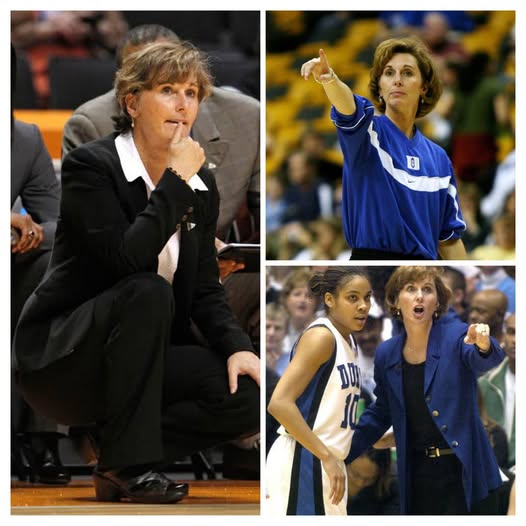When Gail Goestenkors took over the Duke Blue Devils women’s basketball program in 1992, few could have imagined the transformation she would lead. Duke wasn’t a powerhouse in women’s basketball. It wasn’t even a team that regularly sniffed the top of the ACC standings, let alone the national stage. At the time, the program was struggling to establish an identity, let alone a tradition of excellence. But over the course of 15 seasons, Goestenkors didn’t just build a winning team—she laid the foundation for a perennial powerhouse and left a legacy that forever altered the trajectory of Duke women’s basketball.
Arriving at Duke from Purdue, where she served as an assistant under Lin Dunn, Goestenkors brought an intensity and vision that few expected. She was young, just 29, and unproven as a head coach. But she quickly began crafting a new standard of discipline and competitiveness in Durham. Her first few seasons were a grind. Duke had never won more than 16 games in a season, and NCAA Tournament appearances were nonexistent. But Goestenkors never wavered in her belief that the program could rise—and rise it did.
Her early years were marked by building blocks rather than immediate success. Duke went 12-15 in her first season, but that modest improvement hinted at something more. The players were buying into a culture that emphasized grit, teamwork, and relentless preparation. Goestenkors was installing a system of accountability and a style of play that relied on defensive tenacity, smart ball movement, and unmatched stamina. It didn’t take long before the rest of the ACC began to take notice.
By 1995, Goestenkors had led Duke to its first-ever NCAA Tournament berth—a landmark achievement for a program that had never been a part of March Madness. That season represented more than just a win-loss milestone; it symbolized a new era. Duke was no longer content to participate. Under Goestenkors, the Blue Devils would strive to contend.
The late 1990s saw Duke become a regular fixture in the postseason, and by the turn of the century, they were no longer underdogs. They were a juggernaut. Between 1998 and 2007, Goestenkors led the Blue Devils to 10 consecutive NCAA Tournament appearances, including four trips to the Elite Eight and two to the Final Four. In 1999, she guided Duke to its first NCAA Championship game, an unprecedented feat that placed the program on the national map in a way no one could have predicted seven years earlier.
That 1999 run was emblematic of everything Goestenkors had instilled in her team: resilience, poise, and an unshakeable belief in their ability to win. They fell short in the title game to Purdue, ironically her alma mater, but the message had been sent—Duke was no longer a Cinderella story. They were a legitimate national contender, and Goestenkors was now firmly among the elite coaches in the sport.
One of Goestenkors’ most defining traits as a coach was her ability to develop players into stars. Under her guidance, Duke produced a parade of All-Americans and WNBA draft picks, including names like Alana Beard, Monique Currie, and Lindsey Harding. Beard, in particular, stands out as a player who embodied everything Goestenkors valued. Gritty, talented, and fiercely competitive, Beard became one of the most decorated players in college basketball history, and her time at Duke was inextricably tied to Goestenkors’ leadership.
Goestenkors wasn’t just recruiting talented athletes—she was molding complete players and people. Her teams were known for their cohesion and intelligence on the court. They didn’t just rely on athleticism; they executed with surgical precision. Her practices were notoriously intense, often more grueling than the games themselves, but they forged a toughness that defined Duke women’s basketball during her tenure.
Yet for all her tactical brilliance and success on the court, Goestenkors’ legacy is perhaps best measured by the culture she created. She demanded excellence in all aspects—academically, socially, and athletically. Her players were expected to carry themselves with professionalism and integrity, and they did. Her teams not only won games; they represented Duke with class.
In the ACC, a conference dominated by programs like North Carolina and Virginia in the early 1990s, Duke emerged as a consistent threat under Goestenkors. She led the Blue Devils to four ACC Tournament titles and seven regular-season championships, unseating traditional powers and turning the conference hierarchy on its head. Duke became a destination program, attracting top-tier recruits from across the country and boasting a home-court advantage that could rival any arena in the nation.
Goestenkors was named ACC Coach of the Year four times and received national Coach of the Year honors in 2003 and 2007. But her accolades never seemed to define her as much as her focus on team and progress. She often deflected credit to her players and staff, embracing a leadership style that empowered those around her. Her humility and tireless work ethic made her beloved not just by her team, but by the broader Duke community.
In 2007, after 15 seasons at Duke, Goestenkors made the difficult decision to leave for the University of Texas. It was a move that surprised many, and while her departure was a loss for Duke, her legacy was already cemented. She left as the winningest coach in program history, with a 396-99 record and a reputation as one of the most respected minds in the game. More importantly, she left behind a program that no longer needed to explain its legitimacy. Duke women’s basketball had arrived—and it had done so on Goestenkors’ shoulders.
The impact of her tenure can still be felt today. Duke remains a respected force in the women’s basketball world, and the standard that Goestenkors set continues to influence the program’s culture and expectations. Coaches who followed in her footsteps inherited a program built on a rock-solid foundation. That continuity, rare in the ever-changing world of college athletics, is a testament to the structural and cultural work she accomplished during her 15-year tenure.
Gail Goestenkors didn’t just win games—she changed perceptions. She turned a once-irrelevant program into a consistent national title contender. She showed that with the right leadership, vision, and unrelenting commitment to excellence, transformation was not only possible but sustainable. Her story is one of vision, perseverance, and belief in the potential of something greater than oneself.
In the landscape of women’s college basketball, where the spotlight often gravitates toward perennial giants like UConn and Tennessee, Goestenkors carved out a legacy that stands proudly on its own. She built something lasting, not by chasing headlines, but by building a system rooted in accountability, passion, and purpose. For Duke University, her name is etched in the foundation of its success. For the game of women’s basketball, she remains a pioneering figure who proved that greatness can be engineered with patience, discipline, and heart.
Gail Goestenkors didn’t just coach at Duke. She transformed Duke. Forever.



